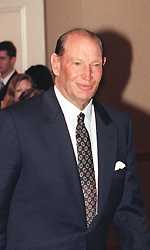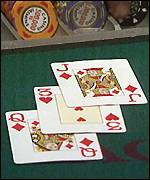|
|
. |
| |
|
|
| |
 Kerry Francis Bullmore
Packer Kerry Francis Bullmore
Packer
born December 17 1937;
died December 26 2005
The
Australian business tycoon Kerry Packer, who died aged 68 following a long
period of ill health, loved gambling, whether in the boardroom or the casino.
In doing so, he transformed a magazine and television business worth millions
into a diversified enterprise worth billions, became his country's richest
person and, in the late 1970s, gained a lasting reputation as the man who
transformed cricket, making the one-day international an established feature of
the sport. In the words of the former Australian captain and commentator Richie
Benaud, "It's because of what happened then, cricket is so strong now".
 Packer believed that people could be bought. In 1976,
before he pulled off perhaps his greatest coup in establishing World Series
Cricket, he was stuck in talks with the Australian Cricket Board about
television rights to Test matches. "Come gentlemen," he said, "there is a
little bit of the whore in all of us; name your price." Packer believed that people could be bought. In 1976,
before he pulled off perhaps his greatest coup in establishing World Series
Cricket, he was stuck in talks with the Australian Cricket Board about
television rights to Test matches. "Come gentlemen," he said, "there is a
little bit of the whore in all of us; name your price."
He also liked to
win, especially at gaming tables around the world, where tales of his
successes, losses and extraordinary tips are legendary. He reportedly lost
£8m playing blackjack in London in 1987, then won £10m at the same
game in Las Vegas eight years later. Tales of tips to hostesses and waitresses
of £50,000 also abounded.
Kerry and his brother Clyde saw little
of their father and when they did it was often to get a taste of Sir Frank's
strict discipline. In a rare interview on radio in 1979 Kerry talked about his
upbringing. "I mean I got a lot of hidings because that's the sort of person
I was and the sort of person he was."
Kerry's young life was lonely
and disrupted. He was sent to boarding school at the age of five, and just a
year later caught a serious illness called polio myelitis or infantile
paralysis. Today children are immunised against the virus but in the 1940s
severe cases could kill or leave a child crippled. Young Kerry's case was
severe and he spent nine months immobilised in an iron lung, an early version
of a respirator, which helped him to breathe.
By the time he got back
to boarding school, at the age of nine, he was way behind his class mates.
Luckily his recovery from polio had been complete because it was his size and
strength that helped him achieve in one area , sport. "My life was sport. I was
academically stupid. My method of surviving through school and those sorts of
things was sport."
Kerry finished school when he was 19 and went to
work for his father's newspapers. He took over the business when Sir Frank died
in 1974.
In 1977 when he couldn't
get exclusive television rights to Sheffield and Test cricket he made up his
own teams with the best players in the world and started World Series Cricket.
If the Australian Cricket Board wanted the services of these players it would
have to give Kerry the TV rights and , in 1979, after a long battle, he got his
way.
In 1987 he sold his two Channel Nine TV stations to businessman
Alan Bond for one billion dollars. It was a lot more than they were worth and
the deal made Kerry Packer his first billion. Three years later, Bond was in
financial trouble and Kerry bought the stations back for just 250 million
dollars.
His greatest love is polo and he spent three months of every
year in England playing the game and millions of dollars on horses, stables and
players for his own team. In 1990 a heart attack while playing polo left him
literally dead for six minutes until he was revived by ambulance officers. But
once again his returned to form. He went on to buy portable defibrillators -
which quickly became known as Packerwhackers - for every ambulance in New South
Wales. His charitable gifts were usually as generous as they were anonymous,
and the episode gave rise to the most quoted of his rare public remarks, when
he told an interviewer: "Son, I've been to the other side, and let me tell you,
there's nothing there."
In 1995 he had a second heart attack, and in
2000 received a kidney from his friend and helicopter pilot Nick Ross. But
eventually his lifelong gamble with life gave out. He might have had an unhappy
childhood, but he was a family man, especially close to his son James, who took
over the businesses in 1996. He also leaves his wife Roslyn, whom he married in
1963, and daughter Gretel.
Legendary
Status
 Mr Packer's legendary status as a high
stakes gambler came to the fore when he took Las Vegas' MGM Grand for $26
million playing blackjack for $200,000 a hand, six hands at a time. It was this
big hit and run style that actually got him barred from stuffy Vegas joints
because they just couldn't take the action. Mr Packer's legendary status as a high
stakes gambler came to the fore when he took Las Vegas' MGM Grand for $26
million playing blackjack for $200,000 a hand, six hands at a time. It was this
big hit and run style that actually got him barred from stuffy Vegas joints
because they just couldn't take the action.
Mr Packer was also reported
to have suffered the biggest losses ever sustained in the UK in September 1999,
dropping £11m ($16.5m) at Crockfords casino in London. However at that
time such sums were only a tiny fraction of the wealth of the owner of
Australia's Nine television network, estimated to be around $8bn.
More
$20 million losses have been reported but there are also tales of incredible
generosity, including a $100,000 tip to dealers and waitresses and loans to
fellow gamblers whose repayment he refuses to accept.
Legend also has it that Mr Packer's grandfather put the family
on the road to riches by buying a passage from Tasmania to the mainland on the
proceeds of a bet on a horse. He found his 10 shilling stake lying in the
street. |
 |
| |
|
|
|
|
| |
|
. |
 |
|
